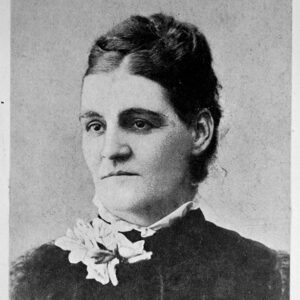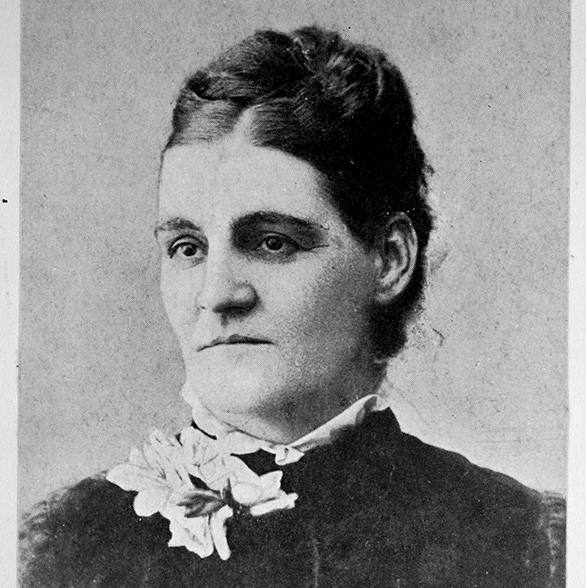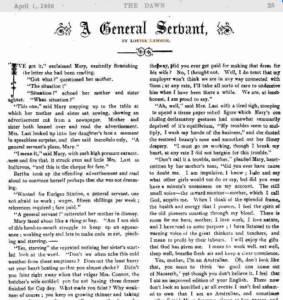by Louisa Lawson
 Louisa Lawson’s newspaper, The Dawn: A Journal for Australian Women was published monthly for 17 years (1888–1905), reflecting Lawson’s views as a suffragist, and her working class origins. This story, which we will run over two issues, today and next Wednesday, is from the Dawn, 1 April 1896, and will be followed on Friday 20/10 by an essay on Lawson from biographer Michelle Scott Tucker.
Louisa Lawson’s newspaper, The Dawn: A Journal for Australian Women was published monthly for 17 years (1888–1905), reflecting Lawson’s views as a suffragist, and her working class origins. This story, which we will run over two issues, today and next Wednesday, is from the Dawn, 1 April 1896, and will be followed on Friday 20/10 by an essay on Lawson from biographer Michelle Scott Tucker.
I’VE got it,” exclaimed Mary, excitedly flourishing the letter she had been reading.
“Got what?” questioned her mother.
“The situation !”
“Situation !” echoed her mother and sister aghast. “What situation ?”
“This one,” said Mary stepping up to the table at which her mother and sister sat sewing, showing an advertisement cut from a newspaper. Mother and sister both leaned over and read the advertisement.
Mrs. Last looked up into her daughter’s face a moment in speechless surprise, and then said incredulously, “A general servant’s place, Mary.”
“I mean it,” said Mary, with such high pressure earnestness and fire that it struck even sad little Mrs. Last as ludicrous, “and this is the cheque for fare.”
“A general servant !” reiterated her mother in dismay. Mary faced about like a thing at bay. “Am I not sick of this hand-to-mouth struggle to keep up an appearance: working early and late to make ends meet, pinching and starving,—
“Yes, starving” she repeated noticing her sister’s startled look at the word. “Don’t we often ache this cold weather from sheer emptiness ? Does not the least hurry set your heart beating so that you almost choke ? Didn’t you faint right away when that vulgar Mrs. Connor, the butcher’s wife scolded you for not having three dresses finished for Cup day. What made you faint ? Why weakness of course; you keep on growing thinner and taking in your dresses to fit you until you are the shape of a sugar ant. Bah ! I’m sick of this genteel bread and tea menu. I’m done with it,” declaimed Mary, forgetting Queen’s English in her disgust.
“But,” said Mrs. Last, to whom Mary’s words had carried conviction, “notwithstanding all this, you could never disgrace us by taking a general servant’s situation on a sheep-station.”
“I would, I can, I must, protested Mary, “and what is more, I’m off this afternoon, the train starts at two and it is now nearly eleven. “
“But what annoyed me,” said Mary, “was that I could not go on my merits, but had to produce a reference; you know I had two Ms. P. [Members of Parliament] to choose from, but so far as character is concerned, I would not give them my shoes to polish. However, of the two evils I chose the least, and got a character from little ‘what do you call him’ in Hunter Street, but I’m sure, the bribe was never coined which would induce me to return the compliment. By the way, did you ever get paid for making that dress for his wife? No, I thought not. Well, I do trust that my employer won’t think we are in any way connected with them; at any rate, I’ll take all sorts of care to undeceive him when I have been there a while. We are, at least, honest, I am proud to say.”
“Ah, well,” said Mrs. Last with a tired sigh, stooping to upend a tissue paper robed figure which Mary’s concluding declamatory gestures had somewhat summarily deprived of it’s equilibrium, “My troubles seem to multiply, I wash my hands of the business,” and she dusted the restored beauty’s nose and smoothed out her flimsy drapery. “I must go on working, though I break my heart, at any rate I did not bargain for this trouble.”
“Don’t call it a trouble, mother,” pleaded Mary, heart-smitten by her mother’s tone, “did you ever have cause to doubt me. I am impulsive, I know; l do and say what other girls would not do or say, but did you ever have a minute’s uneasiness on my account. The still small voice—the inward monitor—mother, which I call God, acquits me.
“When I think of the splendid frame, the health and energy that I possess, I feel the spirit of the old pioneers coursing through my blood. There is room for me here, mother; I love work, I love nature,and I have read to some purpose; I have listened to the warning voice of the great thinkers and teachers, and I mean to profit by their labours. I will enjoy the gifts that God has given me. I mean to work well, eat well, sleep well, breathe fresh air and keep a clear conscience.
“Yes, mother, I’m an Australian. Oh, don’t look like that, you seem to think ‘no good can come out of Nazareth,’ yet though you don’t believe it, I feel that I am an improved edition of your English. There now don’t look so horrified; at all events I can’t feel ashamed to own that I am an Australian, and sometimes mother,” said Mary drawing closer to her parent and speaking more earnestly, “I feel that a responsibility is upon me, that I am in some way a representative of our disparaged race. Whether this is fancy or otherwise I mean to hug the delusion, and do something creditable for the country I love before I die. In any case, I’ll be a patriot.”
“Now, don’t meet troubles half way, mother,” pleaded Mary, and then with artificial hilarity, “who knows, I may not be gone more than twelve months and a day, when a bold knight on a white charger comes prancing up to demand my hand in marriage. Didn’t old Mrs.What-do-you-call-it, tell us that a sheep station was a splendid place to get a husband from. “But of that ‘later on’ as our lodger used to say when asked for rent, and by the same token,” continued Mary in an aside, “the allusion is unfortunate, the husband may never be forthcoming as the rent wasn’t.
“I suppose it would be adding insult to injury if I were to borrow Henrietta’s costume” (as the dummy was called) “to fill up the bottom of my trunk with, but I fear it will take herself, wire extension and all, to completely fill the vacancy. Never mind, Hetty,”
she said, “if I read my stars aright, you may yet shine for a brief hour, in all the bravery of bridal attire, and if you do, I’ll promise you that you take first turn out of my wreath and veil. There now, don’t blush, I’ll tone you down beforehand with the powder puff to make you look interesting. You, at least, one are a standing advertisement for low diet, you are indeed, but, lor, Hetty, you have no nerves, you know, that’s where you’ve got the pull over mother, and Bertha and me, and then again your stomach is good, as you never hear from it, and you are a thorough aristocrat, Hetty; you are so self-contained, you never wrinkle your face with smiles, or get into a passion, nothing interests you, nothing surprises you, you are never ruffled. Cool, yes, cool is the word, and you never do anything. Heavens, Hetty, there is something almost Royal about
you. I must trace your pedigree when I’ve time.”
Mary rambled on in this way, packing and talking as if for dear life, feeling that if she stopped she would break down quite, an act which she knew would ruin all.
Then came the dreadful trial. After fussily tying and untying her hat strings and dragging at her gloves, she came to a dead stop, and looking at her worn mother and delicate sister who seemed so friendless for the moment, so she wavered, but recovering she ran up to Henrietta, and kissing her on either temple, then wiping an imaginary tear from each eye she said, “Cheer up old girl, I’ll soon be home again.” One long hug, one last kiss to the other two and she was gone.
To be continued …






